|
De Amerikaanse schrijver John Fante werd geboren in Colorado op 8 april 1909. Zie ook mijn blog van 8 april 2007 en ook mijn blog van 8 april 2009 en ook mijn blog van 8 april 2010xml:namespace prefix = o ns = "urn:schemas-microsoft-com:office:office" />
Uit: The Road to Los Angeles
I became a flunkie on a truck. All we did was move boxes of toilet tissue from the warehouse to the harbor grocery stores in San Pedro and Wilmington. Big boxes, three feet square and weighing fifty pounds apiece. At night I lay in bed thinking about it and tossing.
My boss drove the truck. His arms were tattooed. He wore tight yellow polo shirts. His muscles bulged. He caressed them like a girl's hair. I wanted to say things that would make him writhe. The boxes were piled in the warehouse, fifty feet to the ceiling. The boss folded his arms and had me bring boxes down to the truck. He stacked them. Arturo, I said, you've got to make a decision; he looks tough, but what do you care?
That day I fell down and a box bashed me in the stomach. The boss grunted and shook his head. He made me think of a college football player, and lying on the ground I wondered why he didn't wear a monogram on his chest. I got up smiling. At noon I ate lunch slowly, with a pain where the box bashed me. It was cool under the trailer and I was lying there. The lunch hour passed quickly. The boss came out of the warehouse and saw my teeth inside a sandwich, the peach for dessert untouched at my side.
"I ain't paying you to sit in the shade," he said.
I crawled out and stood up. The words were there, ready. "I'm quitting," I said. "You and your stupid muscles can go to hell. I'm through."
"Good," he said. "I hope so."
"I'm through."
"Thank God for that."
"There's one other thing."
"What?"
"In my opinion you're an overgrown sonofabitch."
He didn't catch me.
After that I wondered what had happened to the peach. I wondered if he had stepped on it with his heel. Three days passed and I went down to find out. The peach lay untouched at the side of the road, a hundred ants feasting upon it.
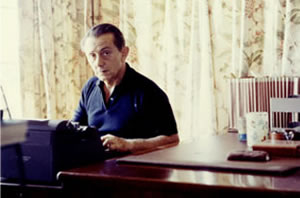
John Fante (8 april 1909 8 mei 1983)
De Amerikaanse schrijver Glendon Fred Swarthout werd geboren op 8 april 1818 in Pinckney, Michigan. Zie ook mijn blog van 8 april 2007 en ook mijn blog van 8 april 2009 en ook mijn blog van 8 april 2010
Uit: The Shootist
He thought: When I get there nobody will believe I could have managed a ride like this and neither by God will I.
It was noon of a bodeful day. The sun was an eye bloodshot by dust. His horse was fistulowed. Some friction saddle and hide, of thorn or stone or knot of thread, had created an abscess on the withers, deep and festering, the cure for which he knew was to cauterize and let the air heal by staying off the animal, but he could not stop. If the horse had suffered, he had suffered more. This was the ninth day of his ride, and the last.
He wore a gray Stetson, a black Prince Albert coat, gray vest and trousers, white shirt, gray bow tie, and boots of black lizard.
Between his backside and the saddle throat was stuffed a soft pillow of crimson velvet trimmed with golden tassels. He could not have endured the journey without the pillow. He had stolen it in Creede, Colorado, from a whorehouse.
He rode below the Organs, a bleak range trending south and east, over sand flats wrinkled with dry washes. Tied on behind his saddle were a black valise and a porcelain coffeepot. The lid of the pot had clanked monotonously all morning. He stopped and turning slowly, untied the coffeepot, turned again and hurled it as high into the air as he was able. He meant to draw and fire and riddle it before it hit the ground, but the effort of hurling roused such pain in his groins that he could not draw. He slumped, gripped the pommel, as the pot hit the ground and tumbled down the side of a dry wash, clanking, clanking.
There were many bosques, or thickets, now and he detoured them. But the trail required him to pass between two, and as he did, a man jumped from the brush and leveled an antiquated cap-and-ball pistol and croaked at him to throw down his wallet. The man was thin and elderly and reminded the horseman of his grandfather, who had been driven occasionally to desperate undertakings. He had a claw hand for a left hand, cocked perpetually at the wrist, the fingers stiff and splayed. Reining up, the rider reached inside his coat.
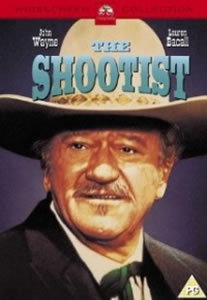
Glendon Swarthout (8 april 1918 23 september 1992)
Affiche voor de film (1976) met John Wayne
De Duitse schrijver Martin Grzimek werd geboren op 8 april 1950 in Trutzhain, Hessen. Zie ook mijn blog van 8 april 2009 en ook mijn blog van 8 april 2010
Uit: Die unendliche Straße
»Hagen?«
Das war meine Mutter. Ich nahm meine Sporttasche, ließ Malte w 2iter durch die Luft sausen, hörte sein Schreien und Jammern und ging durch die Terrassentür ins Haus.
Ich wusste schon, was mich meine Mutter fragen würde. Und es kam prompt.
»Na, hast du heute ein paar Körbe geworfen?«
»Drei«, log ich.
Meine Mutter hatte damals ein ganz spitzes Gesicht. Sie hatte eine Diät gemacht und 'ne Menge
Kilos abgenommen. Sie war richtig zierlich, und ich war schon einen Kopf größer als sie. Immer trug sie Hosen, ich habe sie nie in einem Rock oder einem Kleid gesehen. Eigentlich sah sie aus wie ein
Junge, oder sie wollte zumindest einer sein, glaube ich heute.
Malte schrie immer weiter. Meine Mutter, die Maria hieß, von uns Kindern aber Mam genannt wurde, stand mit einem Messer in der Hand vor mir. Sie hatte Zwiebeln geschnitten und ihre Augen waren gerötet.
»Super drei Körben«, sagte sie und sah mich an.
Ich blickte weg und wusste schon, dass sie mich durchschaut hatte.
Trotzdem log ich weiter: »Wir haben gewonnen.«
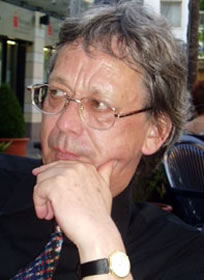
Martin Grzimek (Trutzhain, 8 april 1950)
De Franse dichter en schrijver Hégésippe Moreau (eig. Pierre-Jacques Roulliot) werd geboren op 8 april 1810 in Parijs. Zie ook mijn blog van 8 april 2007 en ook mijn blog van 8 april 2009 en ook mijn blog van 8 april 2010
Si vous m'aimiez
Ménestrel, qui vais par le monde,
N'ayant rien que mon gai savoir,
Si vous m'aimiez, ô belle blonde,
Je me croirais un riche avoir ;
Comme Pétrarque aux pieds de son idole,
A vos genoux courbé bien bas, bien bas,
J'oublierais tout, voire le Capitole,
Si vous m'aimiez
mais vous ne m'aimez pas.
Si vous m'aimiez, ô belle blonde,
De vos baisers seuls j'aurais faim,
Et, sourd à son voisin qui gronde,
Mon cur s'enivrerait enfin ;
Cur mendiant, il va, de femme en femme,
Criant misère, et sans secours, hélas !
Le pauvret meurt : il renaîtrait, madame,
Si vous m'aimiez
mais vous ne m'aimez pas.
Et mes chansons fraîches écloses,
Au vent du matin et du soir,
Iraient à vous, comme les roses
Qui pleuvent devant l'ostensoir.
Purifiant l'air de Paris, madame,
Où vous iriez j'irais, et, sur vos pas,
Comme un parfum je brûlerais mon âme,
Si vous m'aimiez
mais vous ne m'aimez pas.
Sur vous, grand' dame que l'on flatte,
Un lorgnon d'or s'est promené,
Et par le nud d'une cravate
Voilà votre cur enchaîné.
D'un plus heureux que l'hommage vous plaise
Souriez-lui, marchez fière à son bras ;
Son bras ! demain je saurais ce qu'il pèse,
Si vous m'aimiez
mais vous ne m'aimez pas.
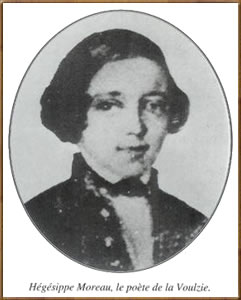
Hégésippe Moreau (8 april 1810 20 december 1838)
De Duitse dichter Johann Christian Günther werd geboren op 8 april 1695 in Striegau. Zie ook mijn blog van 8 april 2007. Zie ook mijn blog van 8 april 2007 en ook mijn blog van 8 april 2009 en ook mijn blog van 8 april 2010
Brüder, laßt uns lustig sein
Brüder, laßt uns lustig sein,
Weil der Frühling währet
Und der Jugend Sonnenschein
Unser Laub verkläret.
Grab und Bahre warten nicht;
Wer die Rosen jetzo bricht,
Dem ist der Kranz bescheret.
Unsers Lebens schnelle Flucht
Leidet keinen Zügel,
Und des Schicksals Eifersucht
Macht ihr stetig Flügel.
Zeit und Jahre fliehn davon,
Und vielleichte schnitzt man schon
An unsers Grabes Riegel.
Wo sind diese, sagt es mir,
Die vor wenig Jahren
Eben also, gleich wie wir,
Jung und fröhlich waren?
Ihre Leiber deckt der Sand,
Sie sind in ein ander Land
Aus dieser Welt gefahren.
Wer nach unsern Vätern forscht,
Mag den Kirchhof fragen;
Ihr Gebein, so längst vermorscht,
Wird ihm Antwort sagen.
Kann uns doch der Himmel bald,
Eh die Morgenglocke schallt,
In unsre Gräber tragen.
Unterdessen seid vergnügt,
Laßt den Himmel walten,
Trinkt, bis euch das Bier besiegt,
Nach Manier der Alten!
Fort! Mir wässert schon das Maul,
Und, ihr andern, seid nicht faul,
Die Mode zu erhalten.
Dieses Gläschen bring ich dir,
Daß die Liebste lebe
Und der Nachwelt bald von dir
Einen Abriss gebe.
Setzt ihr andern gleichfalls an,
Und wenn dieses ist getan,
So lebt der edlen Rebe.
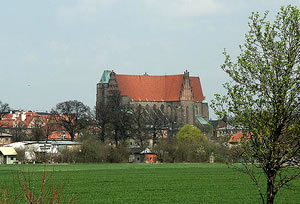
Johann Christian Günther (8 april 1695 15 maart 1723)
Striegau (tegenwoordig Pools Strzegom)
|



